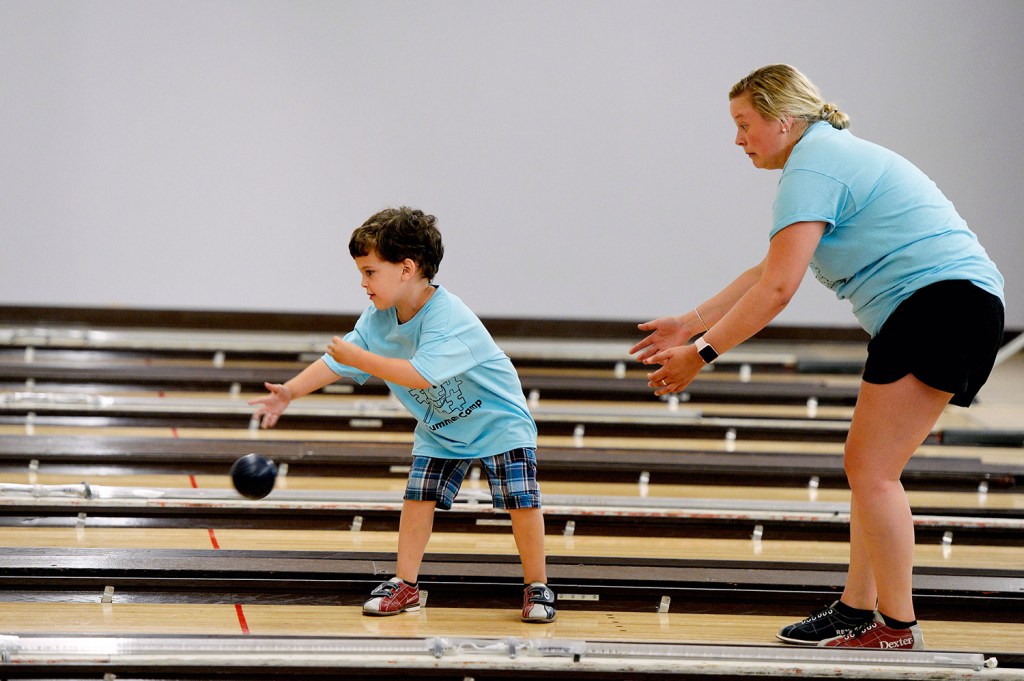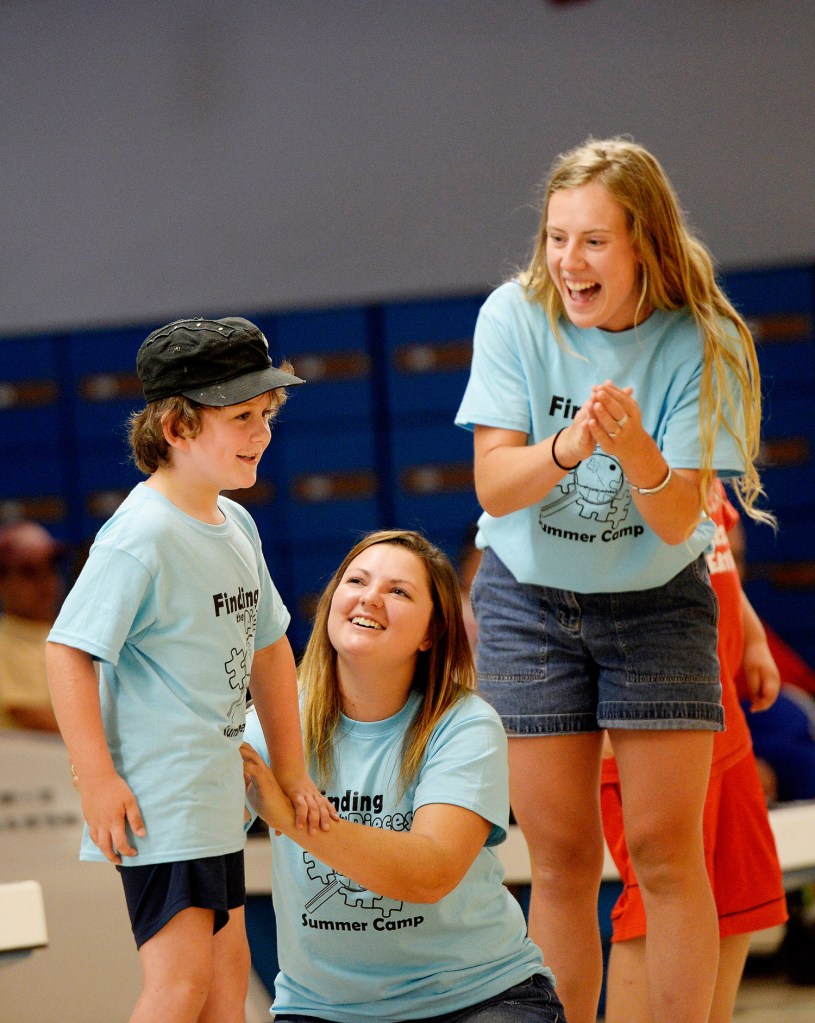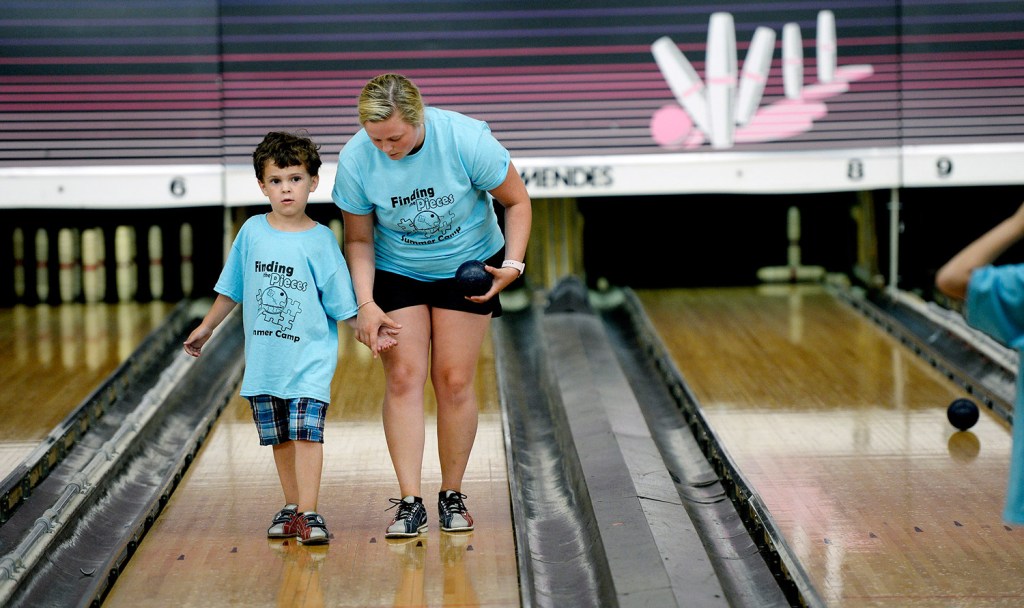BIDDEFORD — It was almost time to leave for the first official camp field trip and Bryce Quattrone was more than ready to go.
With a bag of snacks dangling from his wrist, he stood at the door, peering through the glass at the van waiting outside. So far, the van, with its three rows of back seats and large windows, has been the best part of camp.
But this trip to the bowling alley – where Bryce, 7, already bowls in the winter – could prove to be the highlight of his two weeks at the new Finding the Pieces day camp in Biddeford.

Camp Director Shannon O’Brien looks on as camper Andrew Sturdivent, 5, acts out an emotion while playing charades.
This is the type of camp experience Robert and Jessica Quattrone wondered if their child would ever have. For children like Bryce who have autism spectrum disorder, a traditional camp can be overwhelming because of the noise or lack of structure and often doesn’t provide the individual support they need. Last summer, Bryce tried out the Biddeford Recreation Department’s Safari Camp, but his parents had to pull him from the program because it wasn’t working out.
“I didn’t know what to do,” Jessica Quattrone said. “Where do kids like mine go?”
She called the Autism Society of Maine, which told her about a summer camp in Farmington designed for kids with autism. With information about the camp in hand, the Quattrones set out to bring together the city, school department and the University of New England to launch a pilot program in Biddeford modeled after Camp Summit at the University of Maine at Farmington.
This summer, eight elementary school students are attending the Biddeford camp, where they work one-on-one with counselors and participate in a variety of activities, from arts and crafts to a trip to the local pet store to pet cats and check out lizards.
“This blossomed out of necessity,” Robert Quattrone said last week as Bryce and his fellow campers prepared to leave for the bowling alley. “All of the stars aligned to make this come together.”
‘A LITTLE BIT MORE HELP’
Robert Quattrone, a Biddeford city councilor, and city officials reached out to the University of New England to see whether the school would be interested in partnering to launch a camp in Biddeford. The city agreed to provide transportation, the school department made classroom space available and the Autism Society of Maine provided nonprofit status so camp organizers could collect donations.
The Sanford Elks, a major supporter of causes related to autism, donated $5,500 of the total $7,500 needed to run the camp this year and allow students to attend for free. The Quattrones hope to help raise even more money next year and see the camp expand to include students from other York County towns.
“We’re hopeful this is just the start of something,” said Jeremy Ray, Biddeford’s school superintendent.
The University of New England’s Occupational Therapy Department and Community Therapy Center helped develop and implement the camp program. Caryn Husman, director of the university’s Health, Wellness and Occupational Studies Program, saw it as a perfect opportunity for her students to work one-on-one with children with autism spectrum disorder after taking an undergraduate course about autism.
The undergrads, many of whom plan to go into health care or occupational therapy, earn college credit for their time as camp counselors.

Camp counselor Emily Wasina talks with camper Bryce Quattrone, 7, while playing charades at Finding the Pieces day camp in Biddeford.
“They’re learning how to work specifically with kids with autism and taking those strategies to apply them in a real-world setting. That’s invaluable,” Husman said. “We’re really excited about this.”
The counselors and three paid camp staff members developed a variety of fun activities, along with strategies to tailor the days to the individual needs of campers. For some children on the autism spectrum, a traditional camp could be overwhelming because of the noise or lack of routine. Many campers need one-on-one assistance, which most camps are not able to offer, Husman said.
Shannon O’Brien, a behavior analyst for the Biddeford School Department, jumped at the chance to be director of Finding the Pieces camp. Each day, her campers participate in activities alongside their peers in the Safari Camp. The difference, she said, is that Finding the Pieces counselors can adjust the schedule or activities to meet the needs of the camper they are working with.
“The kids need a little bit more help so they can be successful,” O’Brien said. “The kids like the one-to-one support and the smaller, structured environment. It’s more conducive to their idea of a fun day.”
GETTING KIDS EXCITED
On the third morning of camp, each camper wore a baby blue Finding the Pieces T-shirt. After posing for a few photos at a ribbon cutting ceremony to celebrate the launch of the program, the campers and counselors headed inside JFK Memorial School for their morning meeting.
In the classroom, the campers and counselors talked about their schedule for the days ahead, acted out emotions, socialized with their friends and stretched their bodies into yoga poses. After yoga, the campers each picked out snacks to bring along to the bowling alley.
Finally, it was time to go and Bryce led the line of campers outside and launched himself into the van. Fifteen minutes later, the campers filed through the front door of Vacationland Bowling in Saco, making a beeline for the arcade before putting on their bowling shoes.
Perhaps no one was as excited to bowl as 6-year-old Whit Jackson, who peeked out from under the brim of his black cap as he moved from lane to lane with counselor Kylie Williams. He jumped and cheered each time his ball rolled down the lane, whether it knocked over pins or not.
Whit’s mother, Stephanie Jackson, said the camp has been the perfect option for her son, whose verbal skills are low. The routine of camp has been great for the weeks between the end of his extended school year program and the start of the new school year, she said.
“This program is just ideal and he is so excited to go,” she said. “The people and energy level have him pumped.”
As Whit rolled ball after ball, one camper decided to skip his turn to play a game of checkers with a counselor. Another camper and counselor sat a table nearby, playing with Legos.
Bryce, who bowls with his younger brother and their cousins, snacked on goldfish crackers between turns. Each time he stepped to the line, he held the ball firmly in both hands, rolling it straight down the lane. After knocking over all but one pin, he ran up to his dad and held out his hand for a high five.
“Daddy, I did a good job!” he called out before heading back to his seat to wait for his next turn.
Gillian Graham can be contacted at 791-6315 or at:
Twitter: grahamgillian
Send questions/comments to the editors.








